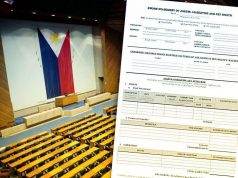Palay prices remain under pressure in mid-April
THE farmgate price of palay, or unmilled rice, continued to decline during the middle weeks of April, with domestic prices still under pressure amid expectations of more liberal imports of cheap rice, even as the government concentrates all its procurement efforts on domestic rice.
According to the Philippine Statistics Authority, the average farmgate price of palay in second week of April fell 0.32% week-on-week to P18.64 per kilogram (kg). In the third week, the corresponding decline was 1.12% to P18.48/kg.
The average wholesale price of well-milled rice fell 0.37% week-on-week to P40.01 during the second week of April, and fell by a further 0.25% to P39.91 during the third week.
At retail, the average price of well-milled rice fell 0.18% week-on-week to P43.79, and fell by a further 0.25% to P43.68 during the third week.
Agriculture Secretary Emmanuel F. Piñol said that his department cannot arrest the price drop because of the deregulation of imports. “Wala na kaming [We do not have] control… that’s why we are strengthening the NFA (National Food Authority),” he told reporters.
Under the Rice Tariffication Law, the NFA has shifted its focus to palay procurement from domestic producers in order to maintain a buffer stock for calamities and emergencies.
He also noted that “As of the moment, stable na stable ‘yung supply ng bigas [the rice supply is very stable]. There is no danger that there will be a spike.”
He added that the last shipments of rice imported by the NFA are still good for five months, which means that such stocks of lower-cost rice are not yet competing in the market during the domestic harvest.
As of April 15, the NFA has breached the two-million bag level for palay procurement. It has procured 2.12 million 50-kilo bags since January, with 845,891 bags bought in April. The procurement target is 350,000 metric tons (MT) of domestic palay.
Meanwhile, the NFA has assured that it is only buying palay from legitimate farmers amid allegations that the agency is buying from fake cooperatives used by traders to sell to the agency at a higher price. Generally, a passbook is needed to be able to sell to the agency.
“First of all, farmers need to secure a passbook from NFA before they can sell to the agency. Requirements for securing this passbook include a filled out Farmer’s Information Sheet with identification picture, and certification from the Barangay Captain, Municipal Agriculturist, Municipal Agrarian Officer or National Irrigation Administration where his farm is located,” NFA Officer-in-Charge Administrator Tomas R. Escarez said in a statement on Sunday.
Farmer organizations must secure a master passbook by submitting their certificate of registration, assembly resolution, and masterlist of members. In cases when a walk-in farmer would want to sell, he can do so up to 200 bags only for the first time. He will then fill out a farmer’s information sheet, so that future transactions will be recorded in a passbook.
The PSA also noted that the average farmgate price of yellow corngrain fell 0.07% week-on-week to P14.06/kg during the second week of April, and fell 0.07% during the third week to P14.05/kg.
The average farmgate price of white corngrain during the second week of April fell 0.44% week-on-week to P15.89. In the third week the average price rose 1.51% to P16.13/kg.
The average wholesale price of yellow corngrain was unchanged at P20.21 during the second week, but rose 0.25% week-on-week to P20.26 in the third week.
At retail, the average price fell 0.08% week-on-week to P24.79 during the second week, but rose 0.56% week-on-week to P24.93/kg during the third week.
The average wholesale price of white corngrain in the second week fell 1.39% week-on-week to P22.73, and fell further in the third week by 0.44% to P22.63.
The average retail price fell 0.88% week-on-week to P29.12 in the second week, and was unchanged in the third week. — Vincent Mariel P. Galang



